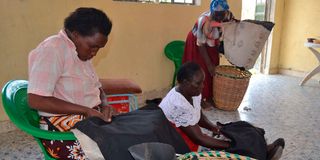Real measure of women’s inclusion is at the grassroots

Women making insulated baskets on August 17, 2021, in Karungaru village in Tharaka-Nithi County.
As a corporate executive in a leasing and asset finance company, it is tempting to view my position as evidence of significant strides in women’s empowerment. However, the reality is different.
When you occupy a seat at the top, you gain a vantage point to observe just how distant we still are from achieving true gender representation.
In the boardroom, I am often the sole woman, confronted with the stark gender disparity. It’s evident in the statistics too. Most financing applicants are men, with women entrepreneurs often seeking funding support through their husbands. Simply because the husband’s name appears on all documents, in resigned acceptance of tradition.
However, tradition isn’t the only barrier women face. The demand for collateral, a common requirement from lenders, further exacerbates the issue. Traditionally, much of this collateral, particularly land, is owned by men. This underscores the urgency and importance of this year’s International Women’s Day theme: #InspireInclusion.
Women are often accused of hindering each other’s progress — of burning the ladder once they have reached the top. I refuse to accept this narrative. Instead, I have made it my mission to actively dismantle these barriers and empower women, particularly at the grassroots.
In asset financing within the agricultural value chain, for example, many have reduced the need for additional collateral beyond the financed asset itself. The result? A remarkable increase in the number of financing opportunities extended to women.
These aren’t just statistics; they represent real women with real stories of empowerment. Of these, there are many living examples.
Moreover, evidence shows that supporting women-led businesses is not just a matter of gender equality but also a strategic imperative. Women-led businesses tend to be more socially and environmentally sustainable, managing risk with better balance and experiencing lower default rates.
In fact, statistics from the developing world demonstrate this trend, with women-led enterprises exhibiting higher profitability and resilience.
Additionally, financing women-led businesses has a ripple effect on the broader community. It creates a more visible impact on the family unit, with improved access to education and better nutrition. Studies have shown that when women are economically empowered, more children attend school, and household welfare improves significantly.
True equality isn’t achieved solely by placing women in positions of power at the top. It requires a fundamental shift in our approach, ensuring women are included at every level of society. By addressing the structural barriers that hinder women's progress — whether it is access to finance, ownership rights, or cultural norms — we can pave the way for a more inclusive and equitable future.
Judy-Anne Wanjiku is the Managing Director, EFKen Leasing





